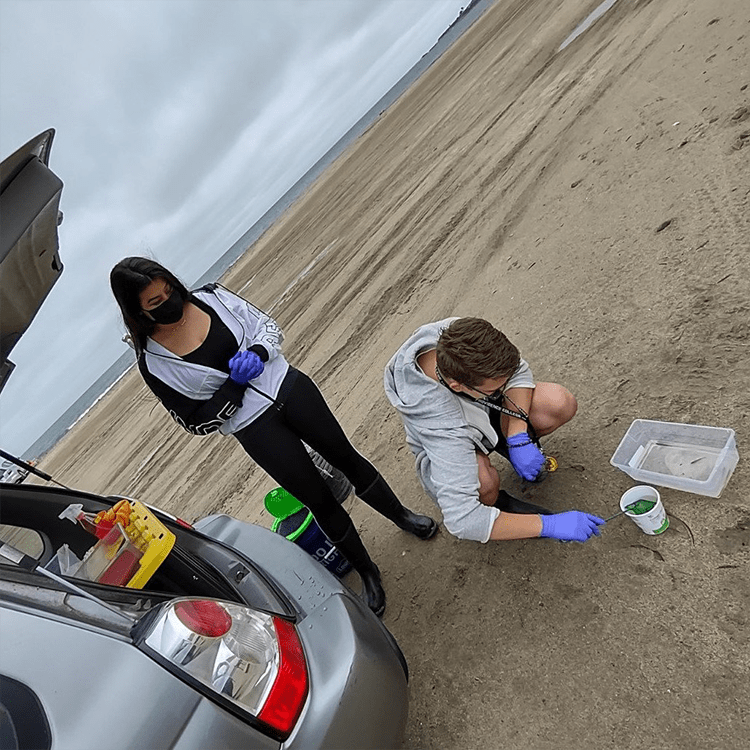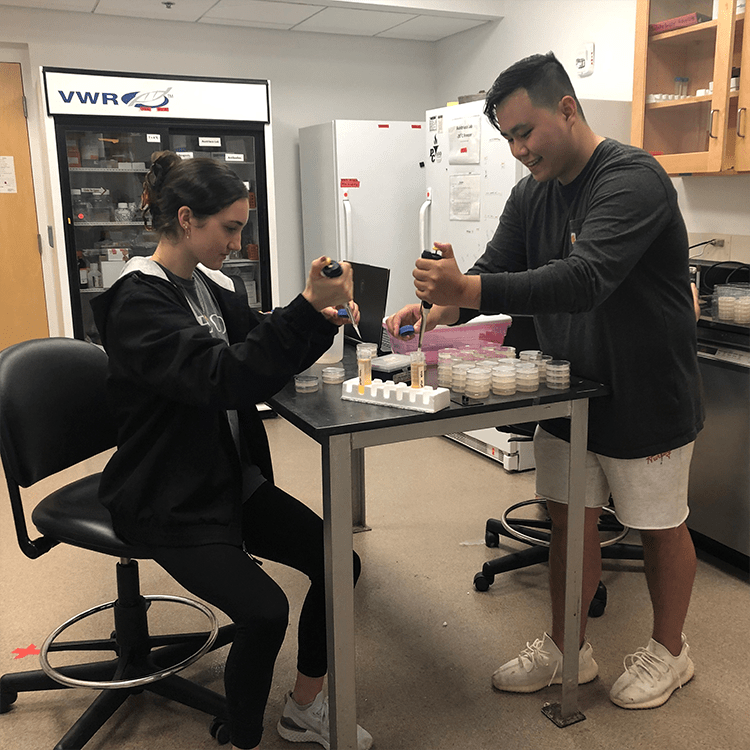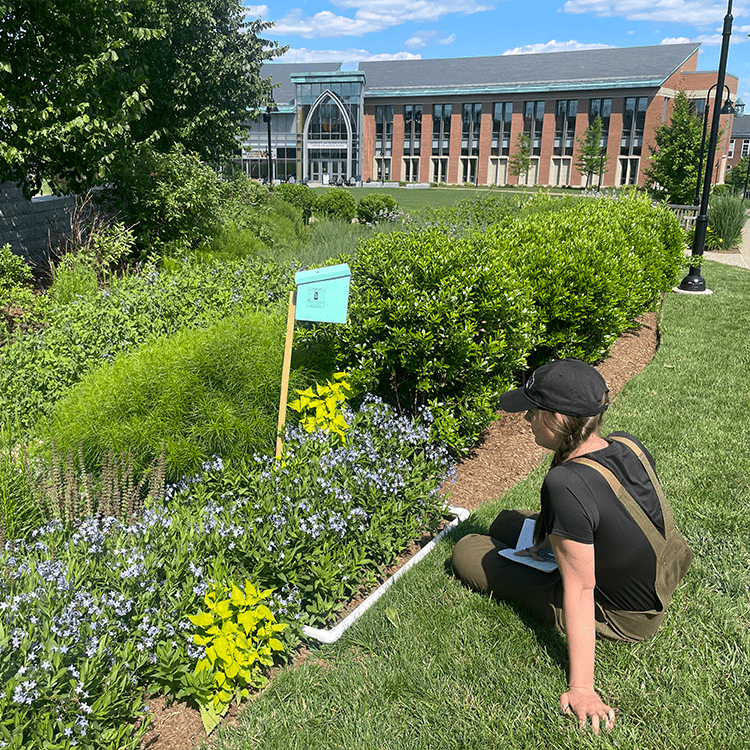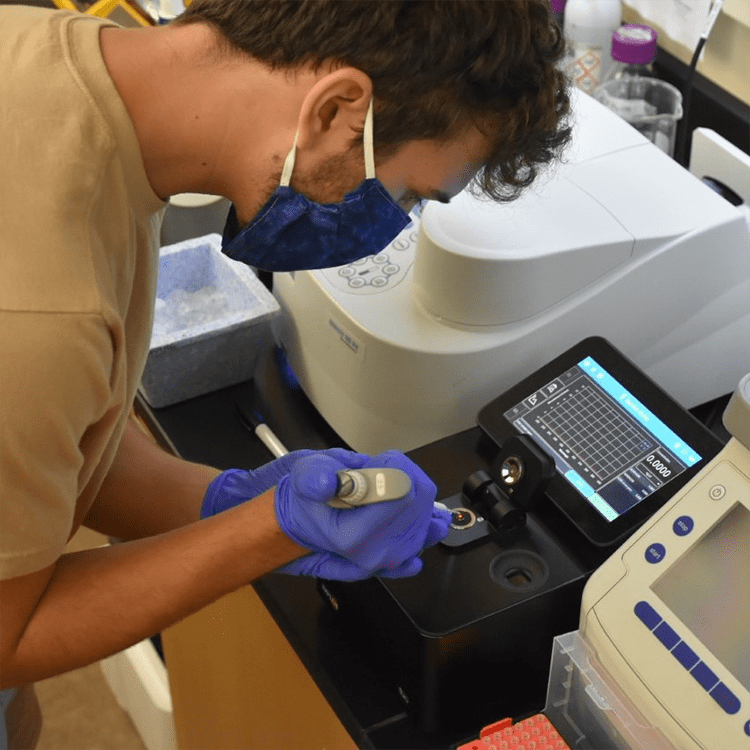Undergraduate research awardees
Congratulations to all the students who secured undergraduate research awards to fund their research this summer! Below we highlight our Friar Biology students.
Summer 2021 Veritas Undergraduate Research Awards
Awarded to Providence College undergraduates. Original publication and full article here.
Circadian phase shifts effect of social jetlag on cellular metabolism and circadian genes in wildtype flies
Olivia Kozub ’23, Biology
Faculty Mentor: Dr. Pamela Snodgrass-Belt, Biology
Drosophila, like humans, have circadian clocks which regulate behavioral and physiological systems within the body. This “biological clock” is synchronized to the environment via temperature and/or light cycles. Small fluctuations in day-length trigger a reset of circadian clocks daily. However, large disruptions can cause health and stress issues such as social jetlag. Social jetlag occurs when an individual’s biological clock clashes with the timing of one’s sleep schedule determined by social factors and the demands of the day.
Navigating the challenges faced by undocumented immigrants seeking women’s healthcare services in the Providence Area
Grace Purvis ’22, Biology and Global Studies
Faculty Mentor: Dr. Tuba Agartan, Health Policy and Management
This project focuses on immigrant women’s access to women’s healthcare needs and on a narrower basis: undocumented immigrant women. My main goal is to better understand how undocumented immigrant women navigate women’s healthcare services in the Providence area.
Comparative genomics of Bdellovibrio: connecting genotypes with predation phenotypes
Sidney Davis ’22, Biology
Faculty Mentor: Dr. Laura Williams, Biology
With the rise of antibiotic resistance, there is a need for alternatives to antibiotics. Predatory bacteria are able to attack plant and animal pathogens, making them potential biological alternatives to modern antibiotics. Based on the literature, there are several genera of predatory bacteria, each with differing predation methods. Though there have been publications focusing on genotypic and phenotypic variations among different genera of predatory bacteria and among different species of Bdellovibrio, there has yet to be a publication that compares the completed genomes of Bdellovibrio available. For my project, I will continue my work on my comparative genomics project on predatory bacteria in which I am investigating how differences in genotype relate to differences in predation. Employing a pangenomics analysis software, I will further explore how particular gene families differ between Bdellovibrio, such as the gene families for lytic enzymes, which predatory bacteria use to invade, digest, and lyse prey.
Surveying Southeastern New England for a rare butterfly, frosted elfin (Callophrys irus)
Isabelle Heron ’22, Environmental Biology
Faculty Mentor: Dr. Racheal Bonoan, Biology
Conservation scientists have discovered an alarming trend that parallels the human-induced alarm of climate change. Similarly to the increase of global emissions and its effect on the environment, the degradation of global habitat has caused an “insect apocalypse”. While it may not seem as prevalent as the great effects that the climate crisis projects on others, the decline in insects means a loss in biodiversity. It also means losing pollination. Pollination is vital in reproduction and distribution of plants and it also provides resources for other animals. When people think pollination, think of bees, most people think of bees, however butterflies are also pollinators. With a decrease in insect populations, it has become more difficult to study their natural history and protect them. By studying insects, we gain a holistic understanding of ecosystems and have a better chance of successful conservation. My research will focus on the Frosted Elfin Butterfly.
Determining the mechanism through which sulforaphane reduces α-Synuclein levels in a Parkinson’s yeast model
Angela Mitsuma ’23, Biology and Music
Faculty Mentor: Dr. Melissa Silvestrini, Biology
Parkinson’s disease (PD) is the second most common human neurodegenerative disease. As such, it is important to investigate possible treatments. Numerous studies have shown α-Synuclein aggregation to be integral to the pathogenesis of PD. Thus, the Austriaco lab has conducted tests to determine Sulforaphane’s (SFN) impact on α-Synuclein levels in a Parkinson’s yeast model. Although our data demonstrates a reduction in α-Synuclein aggregation when using SFN, the mechanism behind this process is still unknown. The goal of my project is to determine if SFN reduces α-Synuclein levels through targeting the YAP1 pathway in yeast. SFN is known to target the KEAP1 pathway in mammals, which is very similar to the YAP1 pathway in yeast. Thus, the YAP1 pathway is a strong candidate for regulation by SFN.
How social behavior and interactions scale with group size in fruit flies
Leigh Paradis ’23, Biology
Faculty Mentor: Dr. James Waters, Biology
The interactions between individuals in social groups are important for how groups perform, but relatively little is known about how interaction patterns scale across different sized groups. Random models suggest that interaction frequency should depend only on density, but biological theory suggests that different kinds of social groups should exhibit different patterns. Using computer vision methods and the open-source R programming language, I will characterize the scaling of interaction rates in groups of fruit flies to test whether their behavior best matches either of the competing hypotheses. My research can be conducted remotely and the results will complement other ongoing projects in the lab involving measuring the metabolic rates of groups of flies.
Walsh Student Research Fellowships
Awarded to undergraduate majoring in Biology, Chemistry, or Biochemistry.
Vision in the long-finned squid, loligo pealei
Linda Ineus ’22, Biology
Faculty Mentor: Dr. Joe DeGiorgis, Biology
Autophagy and lipid maintenance
Megan Kutey ’22, Biology
Faculty Mentor: Dr. Melissa Silvestrini, Biology
The population genetics of rapid evolution in Atlantic killifish
Matthew Rock ’23, Biology
Faculty Mentor: Dr. Jeffrey Markert, Biology
Circadian rhythm effects of social jetlag on stress and health in fischer rats
Shannon Maguire ’22, Biology
Faculty Mentor: Dr. Pamela Snodgrass-Belt, Biology
Experimental evolution of predatory bacteria
Kathryn Mulvey ’23, Biology
Faculty Mentor: Dr. Laura Williams, Biology
Modeling the effects of FTD on brain morphology using Drosophila melanogaster
Jackson Diltz ’22, Biology
Faculty Mentor: Dr. Marla Tipping, Biology
Providence College pollinator surveys
Alexa Pudlo ’22, Environmental Biology
Faculty Mentor: Dr. Rachael Bonoan, Biology









